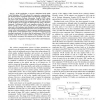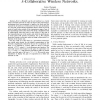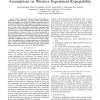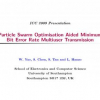ICC
2009
IEEE
14 years 6 months ago
2009
IEEE
Abstract— The problem of resource allocation (RA) in a downlink OFDMA system is examined under the realistic assumption of imperfect channel state information (CSI) at the base s...
ICC
2009
IEEE
14 years 6 months ago
2009
IEEE
—In this paper, quality of service (QoS) provisioning for voice service over cognitive radio networks is considered. As voice traffic is sensitive to delay, the presence of prim...
ICC
2009
IEEE
14 years 6 months ago
2009
IEEE
— In this contribution, we propose a Distributed Turbo Trellis Coded Modulation (DTTCM) scheme for cooperative communications. The DTTCM scheme is designed based on its decoding ...
ICC
2009
IEEE
14 years 6 months ago
2009
IEEE
—Cellular systems in general suffer from co-channel interference, when simultaneous transmissions in other cells use the same physical resources. In order to mitigate such co-cha...
ICC
2009
IEEE
14 years 6 months ago
2009
IEEE
—How to efficiently use the air interface is a crucial issue in wireless networks. In order to improve the performance, mechanisms have been proposed to improve the reach and th...
ICC
2009
IEEE
14 years 6 months ago
2009
IEEE
Abstract— A common assumption in the network coding literature is that the users are cooperative and will not pursue their own interests. However, this assumption can be violated...
ICC
2009
IEEE
14 years 6 months ago
2009
IEEE
—Video-on-Demand (VoD) services have attracted a lot of attentions in recent years. Measurement studies show that VCR (Video Cassette Recorder) operations, such as pause, rewind,...
ICC
2009
IEEE
14 years 6 months ago
2009
IEEE
—Due to the half-duplex property of the underwater acoustic channels, the classic stop-and-wait ARQ (SW-ARQ) and its variants are generally thought to be the only class of ARQ pr...
ICC
2009
IEEE
14 years 6 months ago
2009
IEEE
Abstract—Most researchers conduct wireless networking experiments in their laboratory or similar indoor environments. Such environments are veritable RF jungles, especially when ...
ICC
2009
IEEE
14 years 6 months ago
2009
IEEE




